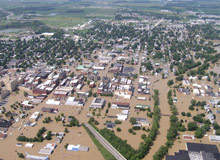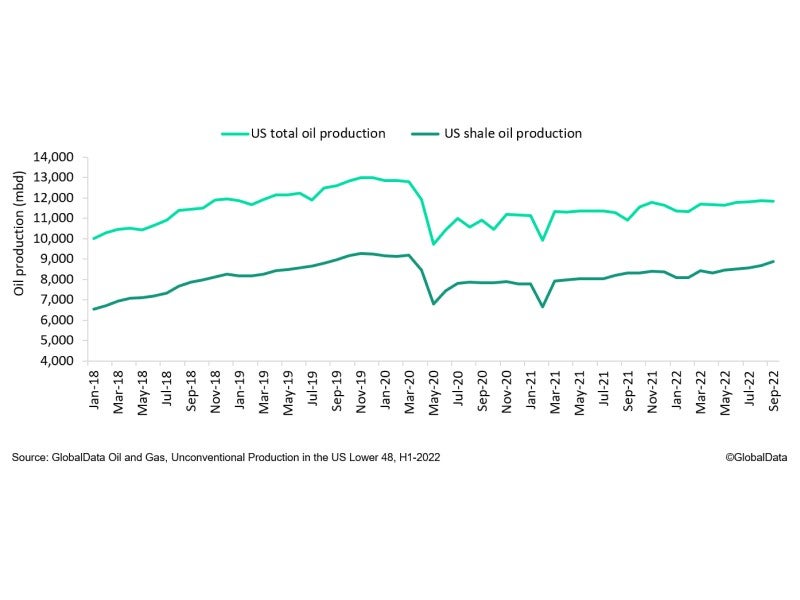
It was Tuesday 21 August and what should have been a normal working day quickly turned into a time for major concern. The town of Findlay in Ohio, North America, was bracing for a flood that was later to be labelled as a "one-hundred-year event".
Marathon Oil Corporation staff, many with homes in the surrounding area, not only had properties and families to worry about as the banks of the Blanchard River swelled, but a job that did not switch off with the unfolding events – supporting several refineries and oil fields in the northern states, as well as pipelines and petrol stations that exist in the surrounding region.
But flooding in Findlay was not a new occurrence – despite the severe circumstances. Previous weather events and potential terror attacks had led Marathon to embark on contingency plans to keep operations running. This flood further provided lessons that could be learnt for its operations on and offshore, across the board.
As power went out, trucks carrying enough workstations to accommodate 42 people each started rolling in and critical business activities were resumed. Within three days, four trailers were allowing operation of key business roles, and there were plans to bring in ten more trailers in less than a week – enough to allow other key community organisations such as schools, shops and community organisations to carry out work in the flood-devastated area. Clearly Marathon’s commitment to developing business continuity plans, led by the corporation’s emergency preparedness group, paid dividends. Lessons learned from this event have been taken into account in revised versions of plans and other Marathon locations have benefited from the experience.
As part of his role with Marathon, Ron Gray has been involved in the preparation of many contingency plans. His title of training and competence coordinator does little to sum up his work with Marathon in the area of contingency planning, for which he is becoming known around the world for his advocacy of business continuity plans in extreme cases.
See Also:
His role in training has gradually evolved to take on emergency response and preparedness as Marathon becomes increasingly aware of the operational risks posed by global situations such as health pandemics, threats of terrorism and natural disasters. Everything, from onshore operations such as that in Findlay to offshore installations and support services, is being looked at with an eye to keeping business running regardless of difficult times.
How well do you really know your competitors?
Access the most comprehensive Company Profiles on the market, powered by GlobalData. Save hours of research. Gain competitive edge.

Thank you!
Your download email will arrive shortly
Not ready to buy yet? Download a free sample
We are confident about the unique quality of our Company Profiles. However, we want you to make the most beneficial decision for your business, so we offer a free sample that you can download by submitting the below form
By GlobalData"We are going beyond looking at dual redundancy of equipment, similar to what you have with offshore, to the problems people may face such as a pandemic like bird flu, which is where a lot of this has evolved from," Gray says. "We want to know what impact such a pandemic can have on operations and if it does happen, how we can keep operations going."
It is not only Marathon that Gray is concerned with. As provision of energy plays its ever-increasing part in modern life – from power supply to hospitals, to heating in cold weather – Gray says it is imperative to look at the bigger picture. A state of emergency would involve many facets of a community, including major oil companies. In extreme cases this could very well require a united approach from governments issuing specific levels of demand, with the military delivering resources and offshore operations providing whatever they can to continue to operate during testing times.
"If a pandemic such as bird flu hits in winter, we could have a big problem, especially if we had no staff to run a production platform. The nation could end up with serious disruptions to power supply. The government could put a lot of pressure on offshore platforms to stay operational for as long as possible," Gray says.
But how prepared is the international industry to take on the responsibility of such requirements? In November 2002, severe acute respiratory syndrome (SARS) tore across Asia and made its way into Europe in less than 12 months. A year later, bird flu (H5N1) became the key concern for scientists and business people. Companies in Asia locked down offices and set up remote working to help keep staff – and critical functions – safe. And the threat continues today, despite being pushed into the back of the minds of the media, and the masses.
"Some of these threats seem intangible," Gray says. "So far no one has been able to fully believe in them – even I can seem a bit sceptical." Gray likens the issue to Y2K in 1999 – one of the most hyped challenges businesses have ever faced, yet it seemed to come and go in the blink of an eye, and with nothing more than a slight date change required on some older computer systems.
"Y2K and the fact that these threats have yet to manifest themselves to the degree predicted means that we tend to operate in ‘fire-fighting’ mode – dealing with the issues of today and not looking at what tomorrow might bring," Gray says.
But a health pandemic can spread fast across a large region and threaten human lives. Not all companies are looking at contingency plans and there is probably more that can be done by offshore players on an individual scale, let alone a global, coordinated approach.
An awareness of this fact has led Gray to the offices of several oil and gas organisations, and placed him on a number of industry work groups, such as the Emergency Preparedness Offshore Liaison (EPOL) Steering Group, comprising of a number of oil companies. On the conference circuit worldwide, he talks about Marathon’s successes, challenges and setbacks in the area and encourages a discussion between other industry experts.
"I think if at any stage we are dealing with a pandemic or similar, then it is going to be global," Gray says. "Some companies may have made an effort to deal with this but Marathon appears to be doing more than a lot of companies out there. We don’t have all the answers but I do think that the industry can work together, and learn a lot from each other from situations that others may already have had to deal with."
For Gray, a flood in Findlay could provide the learning needed to keep one aspect of business running remotely if an epidemic was to hit Norway. "It is all about the sharing of resources and ideas – instead of having everyone reinventing the wheel, we can work off collective thoughts and drive for solutions and mitigations."
Gray is the first person to admit that even Marathon has a lot more to learn. The company may not yet have dealt with a pandemic but it has shut an office in Aberdeen, UK, due to a bout of Norovirus. Seventy-five percent of Marathon’s staff, which provides support to its North Sea, European and West African offshore operations, fell ill, and remaining staff had to be sent home where they were able to keep key business operations running remotely. The closure lasted three days over the Easter period. In a more extreme case, Marathon’s contingency plans would have lasted up to four weeks – "after that it would be a different ball game, and therefore difficult to prepare contingency plans".
It will be this point of the unknown that Gray will emphasise most at his next presentation at the Emergency Planning and Business Continuity Management event in Barcelona next month (2-3 October), where he will once again highlight the gaps in emergency preparedness in the oil and gas industry today. To find out more visit www.jacobfleming.com/conferences.





